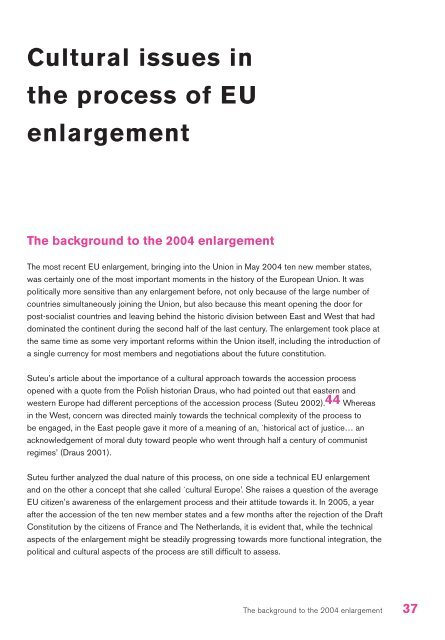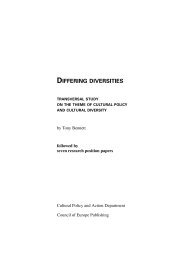Why we need European cultural policies: the impact of EU ...
Why we need European cultural policies: the impact of EU ...
Why we need European cultural policies: the impact of EU ...
Create successful ePaper yourself
Turn your PDF publications into a flip-book with our unique Google optimized e-Paper software.
Cultural issues in<strong>the</strong> process <strong>of</strong> <strong>EU</strong>enlargementThe background to <strong>the</strong> 2004 enlargementThe most recent <strong>EU</strong> enlargement, bringing into <strong>the</strong> Union in May 2004 ten new member states,was certainly one <strong>of</strong> <strong>the</strong> most important moments in <strong>the</strong> history <strong>of</strong> <strong>the</strong> <strong>European</strong> Union. It waspolitically more sensitive than any enlargement before, not only because <strong>of</strong> <strong>the</strong> large number <strong>of</strong>countries simultaneously joining <strong>the</strong> Union, but also because this meant opening <strong>the</strong> door forpost-socialist countries and leaving behind <strong>the</strong> historic division bet<strong>we</strong>en East and West that haddominated <strong>the</strong> continent during <strong>the</strong> second half <strong>of</strong> <strong>the</strong> last century. The enlargement took place at<strong>the</strong> same time as some very important reforms within <strong>the</strong> Union itself, including <strong>the</strong> introduction <strong>of</strong>a single currency for most members and negotiations about <strong>the</strong> future constitution.Suteu’s article about <strong>the</strong> importance <strong>of</strong> a <strong>cultural</strong> approach towards <strong>the</strong> accession processopened with a quote from <strong>the</strong> Polish historian Draus, who had pointed out that eastern and<strong>we</strong>stern Europe had different perceptions <strong>of</strong> <strong>the</strong> accession process (Suteu 2002).44 Whereasin <strong>the</strong> West, concern was directed mainly towards <strong>the</strong> technical complexity <strong>of</strong> <strong>the</strong> process tobe engaged, in <strong>the</strong> East people gave it more <strong>of</strong> a meaning <strong>of</strong> an, `historical act <strong>of</strong> justice… anacknowledgement <strong>of</strong> moral duty toward people who <strong>we</strong>nt through half a century <strong>of</strong> communistregimes’ (Draus 2001).Suteu fur<strong>the</strong>r analyzed <strong>the</strong> dual nature <strong>of</strong> this process, on one side a technical <strong>EU</strong> enlargementand on <strong>the</strong> o<strong>the</strong>r a concept that she called `<strong>cultural</strong> Europe’. She raises a question <strong>of</strong> <strong>the</strong> average<strong>EU</strong> citizen’s awareness <strong>of</strong> <strong>the</strong> enlargement process and <strong>the</strong>ir attitude towards it. In 2005, a yearafter <strong>the</strong> accession <strong>of</strong> <strong>the</strong> ten new member states and a few months after <strong>the</strong> rejection <strong>of</strong> <strong>the</strong> DraftConstitution by <strong>the</strong> citizens <strong>of</strong> France and The Ne<strong>the</strong>rlands, it is evident that, while <strong>the</strong> technicalaspects <strong>of</strong> <strong>the</strong> enlargement might be steadily progressing towards more functional integration, <strong>the</strong>political and <strong>cultural</strong> aspects <strong>of</strong> <strong>the</strong> process are still difficult to assess.The background to <strong>the</strong> 2004 enlargement37














